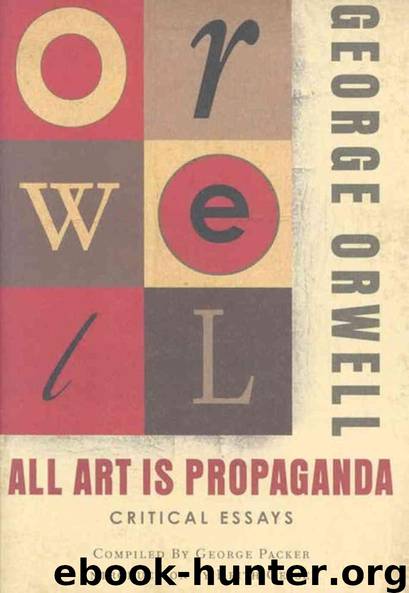All Art Is Propaganda by George Orwell

Author:George Orwell [Orwell, George]
Language: eng
Format: epub
Publisher: Houghton Mifflin Harcourt
and again:
"Cheer for the Sergeant's wedding—
Give them one cheer more!
Grey gun-horses in the lando,
And a rogue is married to a whore!"10
Here I have restored the aitches, etc. Kipling ought to have known better. He ought to have seen that the two closing lines of the first of these stanzas are very beautiful lines, and that ought to have overriden his impulse to make fun of a working-man's accent. In the ancient ballads the lord and the peasant speak the same language. This is impossible to Kipling, who is looking down a distorting class-perspective, and by a piece of poetic justice one of his best lines is spoiled—for "follow me 'ome" is much uglier than "follow me home." But even where it makes no difference musically the facetiousness of his stage Cockney dialect is irritating. However, he is more often quoted aloud than read on the printed page, and most people instinctively make the necessary alterations when they quote him.
Can one imagine any private soldier, in the 'nineties or now, reading Barrack-Room Ballads and feeling that here was a writer who spoke for him? It is very hard to do so. Any soldier capable of reading a book of verse would notice at once that Kipling is almost unconscious of the class war that goes on in an army as much as elsewhere. It is not only that he thinks the soldier comic, but that he thinks him patriotic, feudal, a ready admirer of his officers and proud to be a soldier of the Queen. Of course that is partly true, or battles could not be fought, but "What have I done for thee, England, my England?" is essentially a middle-class query. 11 Almost any working-man would follow it up immediately with "What has England done for me?" In so far as Kipling grasps this, he simply sets it down to "the intense selfishness of the lower classes" (his own phrase).12 When he is writing not of British but of "loyal" Indians he carries the "Salaam, sahib" motif to sometimes disgusting lengths. Yet it remains true that he has far more interest in the common soldier, far more anxiety that he shall get a fair deal, than most of the "liberals" of his day or our own. He sees that the soldier is neglected, meanly underpaid and hypocritically despised by the people whose incomes he safeguards. "I came to realise," he says in his posthumous memoirs, "the bare horrors of the private's life, and the unnecessary torments he endured."13 He is accused of glorifying war, and perhaps he does so, but not in the usual manner, by pretending that war is a sort of football match. Like most people capable of writing battle poetry, Kipling had never been in battle,14 but his vision of war is realistic. He knows that bullets hurt, that under fire everyone is terrified, that the ordinary soldier never knows what the war is about or what is happening except in his own corner of the battlefield,
Download
This site does not store any files on its server. We only index and link to content provided by other sites. Please contact the content providers to delete copyright contents if any and email us, we'll remove relevant links or contents immediately.
| Diaries & Journals | Essays |
| Letters | Speeches |
The Rules Do Not Apply by Ariel Levy(4946)
Bluets by Maggie Nelson(4541)
Too Much and Not the Mood by Durga Chew-Bose(4324)
Pre-Suasion: A Revolutionary Way to Influence and Persuade by Robert Cialdini(4204)
The Motorcycle Diaries by Ernesto Che Guevara(4078)
Walking by Henry David Thoreau(3946)
Schaum's Quick Guide to Writing Great Short Stories by Margaret Lucke(3368)
What If This Were Enough? by Heather Havrilesky(3300)
The Daily Stoic by Holiday Ryan & Hanselman Stephen(3292)
The Day I Stopped Drinking Milk by Sudha Murty(3183)
The Social Psychology of Inequality by Unknown(3011)
Why I Write by George Orwell(2941)
Letters From a Stoic by Seneca(2783)
A Short History of Nearly Everything by Bryson Bill(2679)
A Burst of Light by Audre Lorde(2586)
Insomniac City by Bill Hayes(2535)
Feel Free by Zadie Smith(2472)
Upstream by Mary Oliver(2382)
Miami by Joan Didion(2362)
